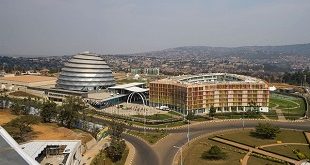Who were the other key players from Uganda?
We had people like Prof. George Kanyeihamba leading the group from London, Kawanga Semogerere with Democratic Party (DP) although he was living in the U.S., Andrew Kayiira with Uganda Freedom Movement (UFM) who was also living in the U.S. The Front for National Salvation (FRONASA) team had been operating from Tanzania already. Museveni, its leader, was organising a western wing against Amin based in Mbarara. We faced pressure from Museveni and Paulo Muwanga saying we were delaying the process of Amin’s removal with the conference. Tanzania even wanted us to form a government in exile. There was Kikosi Malum, Save Uganda Movement which had people like Eteker Ejalu. There were efforts to make sure we build strength so that we had a Ugandan face with Tanzanian support.
Tell me something memorable from this conference. Who made what argument, who gave an impassioned speech?
It was actually one day but we took time to sort out credentials. We were as many as 88 groups and some were jostling to enter from outside the compound and we ended up with only 22. We took time to decide who will qualify to get in lest it becomes a rally. I gave a speech and used a Runyankore proverb saying it is better to feed someone with a running stomach than to feed the ungrateful. As Ugandans we were seemingly ungrateful by taking a long time to form a united front.
Then also how we got Yusuf Lule to become chairman of the National Executive Committee (NEC). Nyerere knew him, they had studied together at Makerere and he was an academic and he was also from the central province. He also had no record of being a UPC figure. He was the right person to lead but as it turned out, we removed him after 68 days because he betrayed the whole trust Nyerere had put in him. He wanted to bring in British and Kenyan troops and betray the Tanzanians.
How influential was Mwalimu Nyerere in facilitating this conference?
By the time we met in Moshi, Mwalimu had already made up his mind that Amin must go. His involvement is inestimable. For him to commit his army and support Uganda the way he did even after the removal of Amin says a lot. He supported the liberation struggle that followed even under NRA. This is someone who went beyond the boundary of his country.
He never recognised Amin as a leader of Uganda. That is why he kept Obote in Tanzania. Also, to him the end of Amin did not mean an automatic return of Obote. Obote tried to fill Moshi with his people but Mwalimu was very clear about Uganda being more than Obote.
That is the mark of a statesman and a historical figure. It is why those of us there at the time feel Mwalimu deserves a greater recognition than he has had.
This event led to the formation of the Uganda National Liberation Front (UNLF). However, immediately after the overthrow of Amin, there were two short-lived regimes. Was this a shortcoming of the conference?
No, it served its purpose of getting Ugandan to give a backing to Mwalimu for removal of Amin. It became a beginning of the reorganising Uganda. Efforts had been made previously like in 1972 to remove Amin but none succeeded. Ugandans were enabled to get back home. Those who were inside could organise and overcome the damage done. When you look back, you are looking at a kind of termination of a history that had recorded failures. Colonialism had yielded to forces of change but the way Independence was managed had produced that situation of Amin. The alliance between UPC and KY producing 21 MPs without being elected, but dominated by Mengo undermined the beginning of democracy. This was a major fault in the foundation of the new politics of Uganda. When the Kabaka of Buganda became president of Uganda; this was an incompatible role.
Do you think a Moshi-like conference can happen today and successfully agitate for political change?
But you see the conditions and reasons for this conference don’t obtain. If you are talking about democracy, the British had been here effectively from 1900 and in 1962, they had not any significant general election. We did not have significant voters in Uganda. So democracy was not here. And if independence meant that you are starting democracy, then that was an abortion.
A constitution that was established in Britain is amended in 1967. After elections in 1962, they do not happen again until 1980. That is 18 years of independence without elections. Then we had an Amin who disorganises Uganda. You can’t say you have a similar situation in Uganda today.
The Ugandan diaspora are among those who contribute to Uganda’s development. That time we were all looking to get rid of the one keeping us outside. The Ugandans outside are not anxious to come and see a new situation by organising a meeting outside. Second, the attack on Tanzania is not replicable. When Uganda has now gone out to help, it has been accepted and recognised be it for Rwanda, Somalia, South Sudan etc.
Looking back after 40 years, what lessons can young Ugandans learn from this historic meeting?
To me, things that led to Amin taking over must be objected to. That history must be understood. Those weaknesses must be obviated. I am satisfied that Ugandans are autonomous where development, national integrity, unity and social progress are all on our menu.
There is a lot of people who need to be appraised on what we he have gone through. They should know the mistakes that led to that confusion must not be made. They should know democracy must be thorough; where we are all involved and where the roots of democracy are deep in our body politic. People should know why we have army representatives in parliament. When you hear of the Military Commission; the idea was that we never allow anybody with a simple gun to take over power when they have no idea on how to use it.
****
 The Independent Uganda: You get the Truth we Pay the Price
The Independent Uganda: You get the Truth we Pay the Price




Dr. Peter Sinabulya is not a dentist. Check your facts.